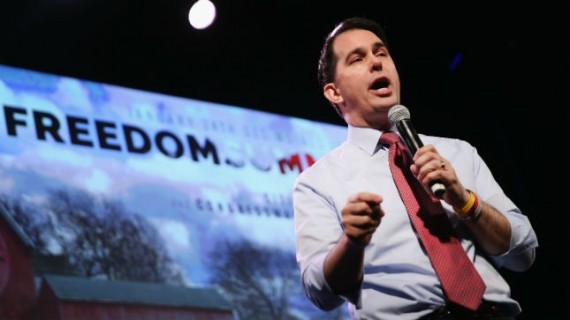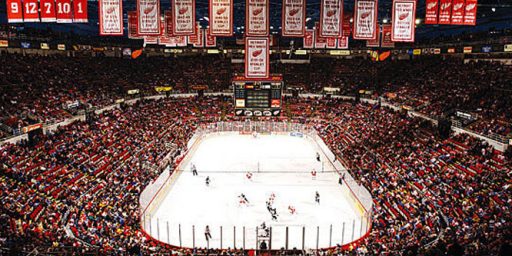Scott Walker’s Crony Capitalism
"Fiscal conservative" Scott Walker is handing Wisconsin taxpayers a $400 million bill for a new arena for the Milwaukee Bucks.
Wisconsin Governor Scott Walker took a break from the campaign trail today to sign into a law a bill that puts Wisconsin taxpayers on the hook to the tune for $400 million to build a new stadium for the NBA’s Milwaukee Bucks:
Governor Scott Walker’s fiscal conservatism will collide with the reality of sports-team subsidies when he commits Wisconsin taxpayers to pay $400 million for a new basketball arena.
At Wednesday’s signing, the Republican presidential candidate’s message of being a tightfisted taxpayer champion will be weighed against public costs spread over 20 years. The ceremony also may draw attention to the $200,000 that the co-owners of the National Basketball Association’s Milwaukee Bucks donated to a group backing his campaign.
Walker is reaching this intersection of principle and pragmatism as he travels early-primary states to prove his low-tax, small-government mettle in a crowded field of Republicans. He runs the risk of rankling conservatives in those places who believe government shouldn’t choose economic winners.
“I don’t think taxpayer money should be used for things like that,” said Tom Thomson of New Hampshire, who is son of a governor and organizer of an effort to get candidates to take a no-tax-increase pledge.
“Why should you burden all the rest of the taxpayers?” said Thomson, whose state holds the first primary Feb. 9. “Let the private sector in Milwaukee work on that.”
The state would put $250 million toward the arena, with interest adding up over decades. The subsidy, approved last month with bipartisan support in Wisconsin’s Republican-controlled legislature, wasn’t addressed in the first presidential debate Thursday. That might change in future forums — or attack ads.
“I don’t think it’s a killer of his presidential ambitions, but it does raise some concerns about what is an appropriate government expenditure,” said Oran Smith, executive director of the conservative Palmetto Family Council, in South Carolina’s capital, Columbia. That state is tentatively set to hold its Republican primary Feb. 20.
Walker, 47, argues that the subsidy is a “good deal,” partly because Wisconsin would lose revenue if the Bucks leave, as they had threatened. The owners of the Bucks, a team whose value Forbes pegged at $600 million, will pick up half the cost of the $500 million arena.
The governor has friendships among the team’s owners, including some who contributed to his presidential effort. Through a limited-liability corporation registered under his son’s name, Bucks co-owner Jon Hammes on May 27 donated $150,000 to the super political action committee backing Walker, according to state and federal records.
Hammes didn’t return a phone call to his office seeking comment on the donation.
The super-PAC also received $50,000 on May 15 from Ted Kellner, another Bucks owner, Federal Election Commission records show. Kellner didn’t return a phone message seeking comment on the deal.
Walker is hardly the first public official on either side of the aisle to sign on to a deal for a sports stadium that is either fully or partially financed by taxpayers, of course. All across the country, you can find examples of such facilities that team owners, who are typically billionaires, have managed to convince public officials to put taxpayer money behind. Typically, of course, the argument is made that the stadium will generate revenue and jobs for the surrounding community. It’s an argument that has worked in Washington, D.C. both with the Nationals Stadium that was built several years ago and the new stadium being built for the city’s professional soccer team. It worked in New York City, which provided public financing both for the new Yankee Stadium and the Mets’ Citi Field when they were rebuilt, and it worked in New Jersey when the Jets and Giants wanted a new stadium at the Meadowlands. It even worked in Detroit in the midst of a bankruptcy, where the city pumped some $400 million into a new stadium for the Detroit Red Wings. There have been some cases where an owner’s appeal for public funds for a private sports stadium were unsuccessful, of course, but for the most part politicians have fallen for the pleas of the team owners. Mostly this seems to due to the a combination of not wanting to be the politician who shoulders the blame if a team follows through a threat to relocate if they don’t get public assistance with a new facility and, of course, the fact that the team owners are often quite generous donors to local politicians. This last fact is quite apparent in Walker’s case.
The reality, of course, is that the economic arguments in favor of publicly financed sports stadium are largely nonsense. Independent economic studies, such as this one by sports economists Roger Noll and Andrew Zimbalist, have shown that taxpayer subsidies for sports stadiums do not lead to significant economic benefits for the community as a whole. University of Maryland-Baltimore County economist Dennis Coates, meanwhile, has calculated that sports stadiums end up costing taxpayers and that people who live in cities with publicly financed stadiums have a per capita income on average that is $40 less than those who do not. While that may not sound like a lot of money, it becomes quite substantial when multiplied over an entire metropolitan area. Other studies have reached very similar conclusions, and seem to establish decisively that the purported economic benefits for localities from publicly financed stadiums are largely a chimera. Unsurprisingly, the people who tend to benefit from publicly financed stadiums are the people who have an immediate interest in the team(s) in question, such as the owners, players, and others that directly benefit from the revenue generated by a sports palace that taxpayers have built for teams owned by billionaires that employ millionaires.
Given the fact that a large part of Walker’s message in his Presidential campaign revolves around the fiscal discipline he supposedly introduced to Wisconsin since he became Governor in 2010, the fact that he is saddling future Wisconsin taxpayers with a $400 million burden seems significant. As Paul Waldman correctly points out, this is exactly the kind of crony corporate capitalism that conservatives claim to be against, and yet here is Walker doing exactly what he claims to be opposed to. Will things like this hurt him as we move forward in the race for the Republican nomination? That will depend on the voters and on whether or not his opponents make him answer for why he is saddling future Wisconsintes with the burden of building an arena for a bunch of billionaires and millionaires.







What a shock…another Republican hypocrite.
Welfare isn’t the problem with these people…it’s wasting welfare on “the others” that bothers them. Doling out corporate welfare is fine by them.
And what a coincidence….Walker cut $250M from the budget of U of W…the same amount he is giving to his wealthy friends (plus the debt service to get to $400M). So where is the bigger return on investment….education or cronyism? If you’re running for President…probably cronyism.
What infuriates me is that Walker also signed a bill that says that welfare recipients have to pee in a cup to receive their benefits- a policy aimed at nothing but humiliating moochers and enriching companies conducting the tests. Given how much welfare the hedge funders who own the Bucks are receiving and reports on how prevalent cocaine abuse is in that industry, I wonder how much pee was required from them…
Public stadium financing is a game the politicians can’t win. They finance it – they are crony capitalists. They refuse, and they are the reason the XYZ are now the ABC. Political suicide either way.
As I said over on Facebook Paul Allen told the city of Portland he needed a new venue for the Portland Trailblazers. They told him OK then build it. He did and it has proved to be a money maker for him. Portland does not have an MLB of NFL team because voters have refused bond measures to build a stadium. Portland as near as I can tell is no worse off as a result.
In terms of direct effects, there’s no reason to believe that a city makes money on a publicly-funded sports arena. Every study I’ve seen agrees on that. The question is the secondary effect – that is, the impact of the claim of being a “world-class” city. New York City wasn’t going to lose its claim to fame when the Giants moved to NJ. LA does better without a football team than with one. But a city like Milwaukee has a tough choice to make. It doesn’t have a lot of prestige outside of sports.
There are 5.758 million people in Wisconsin (as of 2014).
Assuming that only half pay state and federal taxes (with the poor, young and elderly out of that picture)
That means each of the remaining 2.897 Million are each burdened with $138.08 bill.
Now, that’s not asking a lot, if it was to wipe out hunger and homelessness in Wisconsin. But it’s a stadium bill.
Did he make that as a campaign promise? To pass the hat for $140 bucks from each taxpayer in Wisconsin?
As a former Michigander, having recently seen the ruins of the former Pontiac Silverdome Stadium… These are becoming very short lived facilities.
“Claim” being the operative word. Republicans strike me as being very traditional about this sort of thing. There’s a long standing tradition that politics is about which gang gets to divvy up the spoils. So this strikes me as a very conservative thing to do.
I thought our stadium deal for the Bengals had shown everyone the insanity of this. Apparently not.
His failure of oversight at the WEDC looks a lot more like crony capitalism for his campaign and SuperPac donors. Not to mention the pay to write your own legislation that occurred from a long time Republican campaign donor trying to rewrite the state’s alimony and child support laws to suit his needs. This guy will thrown any ;legislation to anyone who gives him enough money every single time. He is a terrible governor by almost every measurable metric.
@Mu:
They refuse, and they are the reason the XYZ are now the ABC. Political suicide either way.
Yep, this is why they almost always acquiesce to the team owners. No mayor or governor wants to be the one blamed for a national sports team leaving the state.
Top comment at WP:
The short answer is “no” – he will not be punished. For god’s sake Trump has insulted women, avoided military service while mocking the ‘hero’ status of disabled military veterans, called our current leaders “stupid” during the most recent televised debate and has declared bankruptcy no less than four (count ’em 4) times leaving creditors on the hook for his bad decisions. As is pointed out here frequently he bankrupted a frikken casino!
Walker will walk away from this not only unscathed but stronger for standing up to the liberal media who are just out to get him, and somebody needs to stand up for the sports fans in Wisconsin who love the Bucks, and don’t pay any attention to the man behind the curtain.
Or something. Dystopia is alive and well in the Republican party.
@Tony W: The Bucks are not well loved even in and around the city. They are perennial losers that make the Brewers seem great by comparison. We traded a draft pick for a coach and a milk stand at the state fair was part of the agreement for Kohl to sell the Bucks a couple years ago. The team barely made the playoffs last year and quickly lost and The Bradley Center was mostly occupied by Bulls fans.
I wonder if the economics are different for indoor arenas. They seat far less than a good stadium, but they can convert to host multiple venues: basketball, hockey, music, comedians, anything that can draw a ~20k crowd.
http://bmore.jschool.umd.edu/summer11/?p=65
great stuff here about the economics of Oriole Park at Camden Yards in Baltimore, a waterfront revitalization project that’s similar to what’s going on in DC with Nationals Park.
@Tillman:
And here’s information about the Verizon Center. an indoor arena stuck smack dab in the middle of downtown DC.
http://www.downtowndc.org/reports/verizon-center-economic-impact
@Dave D:
Oh. Well in that case Walker is toast.
And if he didn’t sign the bill and the Bucks left the state I’m sure he would be criticized for killing jobs. All of the local businesses and restaurants that depend on the Bucks for business would have job losses and then it would be said that Walker is bad for business and a job killer for letting the Bucks leave the state.
I seem to remember there was a lot of talk about seattle getting the bucks if this didnt happen. They are desperate for another basketball team after the supersonics debacle.
“After efforts to persuade Washington state government officials to provide funding to update KeyArena failed, the SuperSonics’ ownership group, led by Howard Schultz, sold the team to the Professional Basketball Club LLC (PBC), an investment group headed by Oklahoma City businessman Clayton Bennett.”
@Ron Beasley:
I hear you Ron. Sports stadiums and arenas should be privately financed – these are profit making private sports enterprises.
For the better part of 10 years the San Francisco Giants asked voters repeatedly to publicly finance a new ballpark, then the ownership group finally asked voters for approval to construct a privately-financed ballpark on the waterfront at China Basin – it passed. Except for some infrastructure improvements near the ballpark the ownership group built their park for about $450M – also, it was the 1st privately finance baseball stadium since Walter O’Malley built Dodger stadium back in 1960.
More cities should say “no”, but they’re afraid to lose a team. Check out Seattle – see “T” above – where the new owner (Bennett, from Oklahoma City) demanded a new publicly financed arena, otherwise he would move the Sonics to OKC – and he did just that.
Clearly Walker has decided that he wants the votes of fans, many of whom would otherwise vote “no” to appropriate tax monies for all kinds of public purposes.
Glinda: Just click your heels together and keep repeating “
There’s no place like homeThis is a valuable infrastructure addition.”@al-Ameda: We are going through the turmoil right now in San Diego. Best the council can come up with is a straw man argument – build the new stadium and it will cost about the same amount as if the Chargers continue to play at the 40 year old park where they play today.
Looks like our Chargers are moving to Los Angeles. Maybe we can use the funding to keep Comic Con here for a few more years.
@Tom:
…are cannibalizing patrons from businesses that already exist. That’s part of the fiction of the “economic boon” of a stadium/arena — the dollars spent there would generally be spent on other local entertainment and dining options anyway. It’s roughly zero-sum for the metro area.
@DrDaveT: Tom’s right that the individual businesses near the stadium may close if the team moves. In scenario A, the jobs will be absorbed elsewhere by the patrons finding different entertainment within the city. In scenario B, they won’t be offset because the city will appear to be in decline. Neither scenario will come to pass completely, so the question is, what percent of jobs will be lost, and can the city restore those jobs in some other way at a lower cost?
@Ron Beasley:
I’m seriously considering a move to Portland right now.
This is one reason. (not having 6 straight days of temps over 100 degrees is another).
I’m sorry you don’t believe in the free market. When did you become a socialist? I didn’t realize conservatives think jobs are created by the government.
@Davebo: Unfortunately we just broke the record for days over 90 and we are not even half way through August yet.
@al-Ameda: And Bennnet is hemorrhaging money in OKC and can’t fill the venue.
@Ron Beasley: No surprise there. The Seattle Census Tract has a population somewhere around 3.5 million, OKC isn’t anywhere near as populous–or with as much disposable income, either.
@Ron Beasley: I’d like to see a source. I watch a lot of basketball and every thunder game I watch seems to be packed in the lower bowl. They are also known as being some of the more involved/passionate fans. Wiki tells me Chesapeake Energy Arena sits 18,203 in basketball form. NBA Attendance stats tell me they averaged 18,203 a game… Let’s be generous and say they fudge the numbers (because of course they do) 16-17K a game over 41 games is still pretty good. The Bucks averaged 14,908.
Also looking at the wiki page for the arena, there are things hosted I would not even think of. Pro wrestling events, pro bull riding events, monster truck races, college basketball tournaments, ultimate fighting championship, christian church events…the list goes on.
Out here in the People’s Republic of San Francisco, the Giants built the best baseball park in the world with private funding. This led to a renaissance in the once blighted China Basin neighborhood. The walk from the Ferry Building to AT&T Park is about as good as it gets.
Maybe some of these “free market” conservative clowns should come to the bay area so we can show them how it’s done…
What the hey? When I lived in Milwaukee (85-88), the big project downtown was to build the Bradley Center as a home for the Bucks. I guess thirty years is just too long a life span for a pro stadium.
@Pinky:
You look at the Brewers lately? From what I see, Milwaukee doesn’t have a lot of prestige in sports either.
@Pinky: They could take a fraction of the same money and put it toward business incubators, high tech research groups, making their universities better (which I bet does the same thing), or a host of more productive activities.
It’s like allowing Walmart to build one of their behemoths downtown. Foot per foot (especially if you include the parking one of those monstrosities demands), a city could gain far more taxes if the same area was sliced up and used for small shops, condos, restaurants, etc.
@Pinky:
Well, any clame that Milwaukee is a “world-class” city is pretty laughable, with or without professional sports in the mix. They are a small market city in terms of pro sports, and a not a strong one at that. The last time Milwaukee produced a championship at the pro level, I was in the 7th grade. Since then, small market Oakland has produced six world championships.
So apparently the “tough choice” is does Wisconsin rob generations of college students so that a couple of billionaires can have cool new toy, or do they tell said billionaires that they will have to rely on the magical private sector?
Any claim that Scott Walker is a fiscal conservative should be met with catcalls and laughter…
@T:
In Milwaukee, few of these take place in the Bradley Center, although there are still a very few concerts there (Trans-Siberian Orchestra, for example). Almost all of these kind of events take place at the UW-Milwaukee Panther Arena, a smaller and cheaper venue nearby. It has about 12,700 seats and was built in 1950!
@anjin-san:
They built the field of dreams in Iowa?
I honestly cant decide which fanbase is more insufferable. Giants, Red Sox, or Cardinals. The amount of humblebrag that goes on is absolutely disgusting.
@OzarkHillbilly: We’re in a rebuilding decade.
@anjin-san: Milwaukee is a tremendous city but it will always be a second tier American city due to it’s proximity with Chicago. Where would you rather go Chicago, or a smaller but in my opinion more charming city with less to do an hour and a half away. Chicago has always been a bigger draw and will continue to be. Cities thirty minutes outside of Milwaukee are now considered to be in the Chicago metro because of all the people who commute via Amtrak. Milwaukee is a great city, but probably won’t ever be world class, and our sports teams have been terrible as long as I can remember.
@T:
Have you ever been to AT&T Park? If so, which ballpark do you consider to be superior, and why?
@Dave D:
I’m from Oakland originally, third generation – I know all about the second-tier thing 🙂
@grumpy realist: Many years ago the the Cincinnati Enquirer printed the results of a study that claimed, remembering rough numbers, that the Bengals, who later got a really, really nice new stadium, generated 30 million in additional business in Cincinnati, the Reds, who got a pretty nice new stadium, 300 million, and the arts; the symphony. opera, art museums. etc. collectively 300 million, and are still hoping they can get the city and county to kick in something toward renovating Music Hall.
@anjin-san:
No.
all of them
There arent any giants fans in them, oh wait except for all the bandwagon frontrunners.
bandwagon frontrunners just like yourself 😀